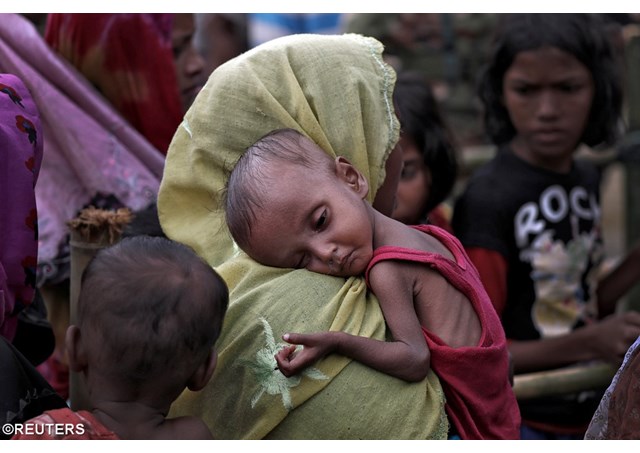
Save the Children alarmed over Rohingya children’s condition in Bangladesh

(Vatican Radio) An international children’s charity and rights group has raised alarm over the condition of at least 14,000 malnourished children in Bangladesh’s Cox Bazar district, where Rohingya Muslim children and families have sought refuge from violence against them in neighbouring Myanmar’s Rakhine state.
"Very high" risk
The “Save the Children” group, that strives to save children’s lives and ensure a future for them, warned that water-borne diseases could have potentially catastrophic effect among the displaced in the over-crowded camps and informal shelters.
According to the group, more than 480,000 Rohingya have arrive in one month alone, and over 4,500 have been treated for dysentery. The scarcity of drinking water and sanitation combined with the monsoon rains are creating ideal conditions for outbreak of epidemics such as cholera. According to the United Nations World Health Organization (WHO), the risk is “very high”.
Sanitation, drinking water, hygiene
Save the Children is asking for an increase in basic health services alongside greater access to sanitation, drinking water and personal hygiene material.
“This is a fertile ground for a great health crisis,” warned the director of Emergency Health Unit of Save the Children, Unni Krishnan. He said thousands of persons sleep in the streets or in lucky shelters amidst dirty and contaminated water where nutrition and hygiene conditions are low. “Most of them have faced some form of violence and fled their homes. They need psychological support,” Krishnan said in the Bangladeshi capital, Dhaka.
Save the Children is preparing to send out at least nine health teams in the Cox’s Bazar district, where Rohingya refugees are still arriving from Rakhime state.
Keeping pace
Krishnan explained that the Bangladeshi government and other organizations are trying to meet the emergency but the volume and speed of the arrival of Rohingya refugees requires keeping pace with the people and their needs. “Every epidemic in these fragile conditions, with persons forced to live in tight spaces, could spread fast and be potentially catastrophic,” Krishnan warned. He particularly expressed concern for children’s health, especially those below 5 years of age, pregnant women and nursing mothers. “We will continue to collaborate with the government to reach the most vulnerable groups,” he added.
In collaboration with the Bangladeshi government and other organizations, the children’s charity made a quick study of the health situation among the Rohingya refugees. Save the Children had ramped up its distribution of aid, including healthcare products such as soap, diapers, water purifying tablets, buckets etc.
| All the contents on this site are copyrighted ©. |


